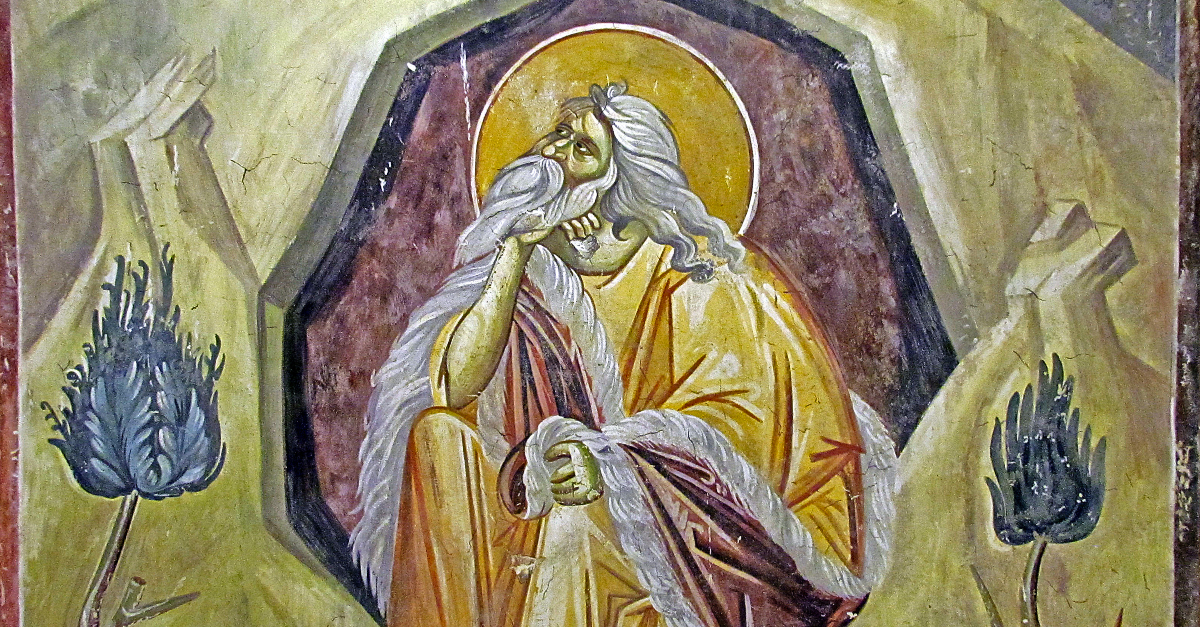Claims to fame: Elijah is one of the greatest prophets and miracle workers in the Hebrew scriptures. He is also one of two prophets who appear with Jesus on the Mount of Transfiguration.
Worst failures: Fearing Jezebel, Elijah flees into the desert and asks the Lord to take his life. He wrongly assumes that he is the Lord’s only prophet within the kingdom of Israel.
Meaning of the Name "Elijah" in the Bible
The name Elijah comes from the Old Testament of the Bible and stems from a Hebrew expression signifying, “Jehovah is my God.” The biblical Elijah was a prophet known for upholding the worship of God and doing miracles in God’s name. The prophet Elijah is venerated by Jews, Christians, and Muslims alike.
According to VeryWellFamily, the name Elijah has the following origin, gender use, and pronunciations:
- Origin: The name Elijah comes from the Hebrew words El (God) and Yah (Jehovah). It is found in the Old Testament, specifically in the First and Second Books of Kings.
- Gender: Elijah is historically the masculine form of the name. Eliyah and Eliana are sometimes used as feminine variations.
- Pronunciation: el-EYE-jah or uh-LIE-jah

Who is the Prophet Elijah in the Bible?
Prophet Elijah (Greek name Elias), the God-seer, miracle worker, and zealot for faith in God was born of the tribe of Aaron in the town of Tishba, for which he was called the Tishbite. When Elias was born, his father Sabbas saw angels of God hovering around the child, wrapping the child in fire and feeding him flames. That was a foreshadowing of Elias's fiery character and his God-given fiery power. He spent his entire youth in divine contemplation and prayer, frequently withdrawing into the wilderness to contemplate and pray in tranquility.
At that time, the Jewish kingdom was divided into two unequal parts: the kingdom of Judah, consisting of only two tribes--the tribes of Judah and Benjamin, with their capital in Jerusalem; and the kingdom of Israel, consisting of the remaining ten tribes, with their capital in Samaria. The descendants of Solomon governed the former, and the descendants of Jeroboam, a servant of Solomon, governed the latter.
The greatest confrontation that the prophet Elias had was with the Israelite King Ahab and his evil wife Jezebel, for they worshipped idols and were turning the people away from serving the One Living God. In addition, Jezebel, a Syrian, persuaded her husband to erect a temple for the Syrian god Baal and appointed many priests to the service of this false god.
Through great miracles, Elijah displayed the power and authority of God. He closed up the heavens so that there was no rain for three years and six months; he called fire down from heaven to consume the sacrifice to God, which the pagan priests were unable to do for the false god, Baal; he brought rain by his prayer; he miraculously multiplied flour and oil in the home of the widow in Zarephath, and resurrected her son; he prophesied to Ahab that the dogs would lick up his blood, and to Jezebel that the dogs would consume her flesh--all of which came to pass; and he performed many other miracles, and prophesied other events as well.
He spoke with God and heard the voice of God in the calm after the wind, earthquake, and fire on Mount Horeb. Before his death, he designated Elisha as his successor in the prophetic calling; with his mantle, he divided the waters of the Jordan. Finally, he was taken up into the heavens in a fiery chariot drawn by fiery horses. On Mount Tabor, he appeared together with Moses beside our Lord Jesus Christ at the Transfiguration. At the end of the world, Elijah will appear again to put an end to the power of the Antichrist (Revelation 11). (Sourced from the Prologue of Ochrid, July 20th)
Bible Verses about Elijah
If you’re going to read only three Bible chapters about Elijah, take 11 minutes and read 1 Kings 17-19. Or take four minutes and read the main part of the story in 1 Kings 18.
Most of Elijah’s story is told in 1 Kings 17-19 and 2 Kings 1-2.
Quick references to Elijah appear in 2 Kings 3:11, 2 Kings 9:36, 2 Kings 10:10, and 2 Kings 10:17. In addition, Elijah shows up near the end of the Hebrew scriptures in 2 Chronicles 21:12-15 (letter telling Judah’s king Jehoram about his forthcoming and rather gruesome death).
And he shows up at the end of the Old Testament in Malachi 4:5-6 (prophecy about John the Baptist as the forerunner of the Messiah).
In the New Testament, quick references to Elijah appear in Matthew 11:14, Matthew 16:14, Matthew 27:47-49; Mark 6:15 and Mark 8:28; Luke 1:17, Luke 4:25-26, Luke 9:8, and Luke 9:19; John 1:21 and John 1:25; Romans 11:2; and James 5:17-18.
Last but not least, Elijah appears with Moses and Jesus on the Mount of Transfiguration in Matthew 17:3-13, Mark 9:4-13, and Luke 9:30-33.
Elijah’s Missing Years from the Bible
We’re introduced to “Elijah the Tishbite, who was of the settlers of Gilead” in 1 Kings 17:1.
We’re told nothing more, not even who his parents were.
For that reason, Elijah’s life story doesn’t start until he’s probably 30, 40, or 50 years old. Yes, we typically think of Elijah as an old man, but that may or may not have been the case.
Elijah’s Ministry Years in the Bible
Elijah never has anything good to say about wicked tyrants. Near the end of his ministry, Elijah writes a letter informing the southern kingdom of Judah’s wicked king Jehoram that he will die in a most excruciating manner.
Otherwise, Elijah focuses his ministry on the northern kingdom, condemning Israel’s wicked King Ahab, Queen Jezebel, and their sons.
Then again, Elijah isn’t just doom and gloom. During three and a half years without rain, the Lord instructs Elijah to hide. First, the Lord tells him to hide by a stream called Cherith east of the Jordan River, where ravens will feed him.
Second, the Lord tells Elijah to hide in a town called Zarephath on the Mediterranean coast between Tyre and Sidon. There a poor widow will feed him from a miraculous supply of grain and oil. In this season of hiding, the Lord graciously cares for Elijah at every turn.
At the end of these years without rain, Elijah calls a national contest on Mount Carmel between the Lord God, creator of heaven and earth, and the wicked pagan gods of Baal and Asherah. It’s quite a dramatic story well worth reading or reading again.
After his great triumph atop Mount Carmel, however, Elijah fears Queen Jezebel’s vow to take his life “by about this time tomorrow” (1 Kings 19:2).
Actually, “fears” is an understatement. Elijah flees into southern Judah’s wilderness, collapses under a tree, and begs the Lord to take him before Jezebel’s men find and slaughter him. In other words, Elijah is depressed out of his mind.
In this season of hiding, the Lord sends an angel to revive him and give him his final instructions, including appointing his successor, Elisha.
Elijah’s Miracles in the Bible
- Causing rain to cease in Israel for three and a half years (1 Kings 17:1). Being fed by ravens sent by the Lord (1 Kings 17:2-7). Multiplying a widow’s grain and oil (1 Kings 17:18-16). Raising that widow’s son from the dead (1 Kings 17:17-24).
- Calling fire from heaven atop Mount Carmel (1 Kings 18:36-38). Causing it to rain again after three and a half years of drought (1 Kings 18:44-46). Fasting from food for 40 days while trekking to Mount Horeb (1 Kings 19:8).
- Prophesies that Ahab’s sons would all be destroyed (1 Kings 21:22). Prophesying that Jezebel would be eaten by dogs (1 Kings 21:23). Prophesying that Ahaziah would die of his illness (2 Kings 1:4-17). Calling fire from heaven to destroy 51 soldiers (2 Kings 1:10).
- Calling fire from heaven on another 51 soldiers (2 Kings 1:12). Parting of the Jordan River while accompanied by Elisha (2 Kings 2:8). Promising that Elisha would receive a double portion of his spirit (2 Kings 2:10).
- Being caught up to heaven with a chariot of fire (2 Kings 2:11). Prophesying that Jehoram would die a horrible death (2 Chronicles 21:12-15). Appearing with Moses and Jesus (Matthew 17:3-13; Mark 9:4-13; Luke 9:30-33).
Lessons From Elijah's Bible Story
Moses has his place in American cinema with The Ten Commandments and The Prince of Egypt. It’s about time someone commissioned a new epic about one of the Old Testament’s other truly great heroes.
The prophet Elijah ranks right up there with Moses as one of the most dramatic prophets of the Lord. At Elijah’s word, kings trembled, the rains stopped, a jug of oil never ran dry, a boy was raised from the dead, fire fell from the sky, revival broke out, and hundreds of idolatrous prophets of Baal were executed.
Yet James 5:17 says that “Elijah was as human as we are.”
After running almost the length of a marathon, this great prophet entered the city of Jezreel just in time to hear wicked Queen Jezebel’s murderous threats.
How does Elijah respond?
True to life, Scripture says he panicked.
After several days on the run, Elijah collapses — exhausted, lonely, frightened, and feeling utterly defeated. In his desperation, he foolishly begs the Lord to take his life.
Instead, the Lord renews Elijah — with a double portion of food, drink, rest. And then he sends him out again with a powerful demonstration of his power, with a quiet word to his heart, with a new commission, and with the assurance that many others also were on his side.
Whether in victory or despair, we can trust the Lord to know exactly what we need and to meet our every need in His sometimes, miraculous ways.
For further reading:
Did God Condone Violence Found in the Old Testament?
Photo Credit: ©iStock/Getty Images Plus/AlexRaths





